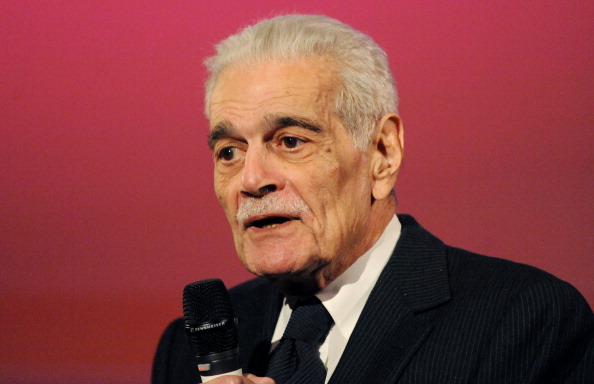
Amid the tributes that flowed from around the globe following the death of Omar Sharif on Friday, a collective voice emerged from the late actor’s homeland of Egypt, and the wider Middle East, lamenting the loss of a star who, for the past half a century, had been their biggest internationally recognized ambassador on the world stage.
Indeed, since Sharif first emerged on Hollywood screens as a wobbly, pixelated dot on the horizon of the Jordanian desert to defend the well where Peter O’Toole’s Lawrence of Arabia was drinking, there hasn’t been another Arab figure in the entertainment industry to ever come close to reaching the same celebrated heights.
Of course, talent has crossed borders and made its mark, but no one from the Arab world has been accepted into Hollywood’s mainstream like Sharif managed in the 1960s when he first decamped from Cairo to Los Angeles and found his footing comfortably alongside the icons of the day (he moved in next door to Elvis Presley).
“It was a combination of the opportunity that he had in that movie, Lawrence, that role, and at that time,” Steve Kenis, Sharif’s long-time agent, who worked with the actor for over 40 years, suggested to The Hollywood Reporter. “There was the opening in the industry, and there he was.”
Speaking to this journalist six years ago about the subject, Sharif himself said that it was “not logical” that another Arab actor would become a star in Tinseltown. “I was the only one that made it; there will not be another,” he said.
Fifty-two years on from Sharif’s break in 1963, the relationship between the Middle East and the West has deteriorated markedly, something that has created major stumbling blocks for those looking to follow in his footsteps.
“I wonder if that role in that movie, coming out today, would have the same effect on his career, because of the political things that have happened, particularly in the last 15 years,” says Kenis. “The industry has always preached tolerance and acceptance, no more so than right now. But the arching socio-political climate is different. You can have an industry that believes something, but they don’t buy all the tickets.”
After Lawrence, Sharif would go on to play Russian poets, New York Jews, Cuban revolutionaries, British sea captains and German generals in his early career, regularly seen as the suave, mysterious “other,” but as characters that were very rarely the villain. A common grievance among Arab actors of late is that the parts offered in major titles seldom move away from their ethnicity and come laced with negative stereotypes taken from more current affairs.
“His loss begs the question, who is our Omar Sharif now — our internationally renowned Arab movie star? Where are the roles for the charming Arab actors and actresses today?” asks Jehane Noujaim, the Oscar-nominated director of The Square. She touts the likes of Khalid Abdalla (The Kite Runner) and Amr Waked (Lucy) as two “great actors,” who have the ability, but not the suitable parts. “We have managed to find plenty of roles for the terrorist, but where are the roles for the enlightened charismatic Arab?”
Waked, who also starred in Salmon Fishing in the Yemen and Netflix’s Marco Polo series, has become an increasingly regular face in international cinema, although he has previously admitted to having rejected “many extremely disappointing offers” that arrived after he first broke through in his role with George Clooney in Syriana (playing a radical Muslim cleric).
“I doubt it,” Waked says when asked if another Sharif will ever emerge. “This guy was exceptional, and he was born in exceptional times.”
L.A.-based actor and producer Waleed Zuaiter, who starred in last year’s Oscar-nominated Palestinian thriller Omar in addition to smaller roles in House of Cards and Masters of Sex, says that Sharif’s stardom “transcended ethnicity.” But he asserts that while Arab actors of today can indeed still play leading roles on screen, the type casting they’ve experienced isn’t going to change any time soon.
“Let’s face it, we are lately largely considered — and are marketed as — ‘the enemy’ to the Western world,” he says.
Kenis suggests that for the film industry to welcome another Arab screen idol on par with Sharif, a role similar to that of Sherif Ali in Lawrence of Arabia was required. “It would take that kind of role, in that kind of movie. A positive, heroic role, in an epic movie,” he says.
Zuaiter, who admits to being an optimist, is hopeful that it will happen and that more diverse casting calls will eventually open the doors for another Sharif, if only because he believes an iconic figure of his caliber is vital to addressing the current situation.
“I think the world now needs an Arab hero more than ever before,” he says. “We need a positive, courageous, attractive, sexy and charming image that hails from the Arab world, male and female. The Arab world is in shambles, so maybe a positive image can help unite and champion rather than separate.”
Adds Zuaiter: “We all want to be the next Omar Sharif. And I sincerely hope we all will!”
More Must-Reads from TIME
- Donald Trump Is TIME's 2024 Person of the Year
- Why We Chose Trump as Person of the Year
- Is Intermittent Fasting Good or Bad for You?
- The 100 Must-Read Books of 2024
- The 20 Best Christmas TV Episodes
- Column: If Optimism Feels Ridiculous Now, Try Hope
- The Future of Climate Action Is Trade Policy
- Merle Bombardieri Is Helping People Make the Baby Decision
Contact us at letters@time.com